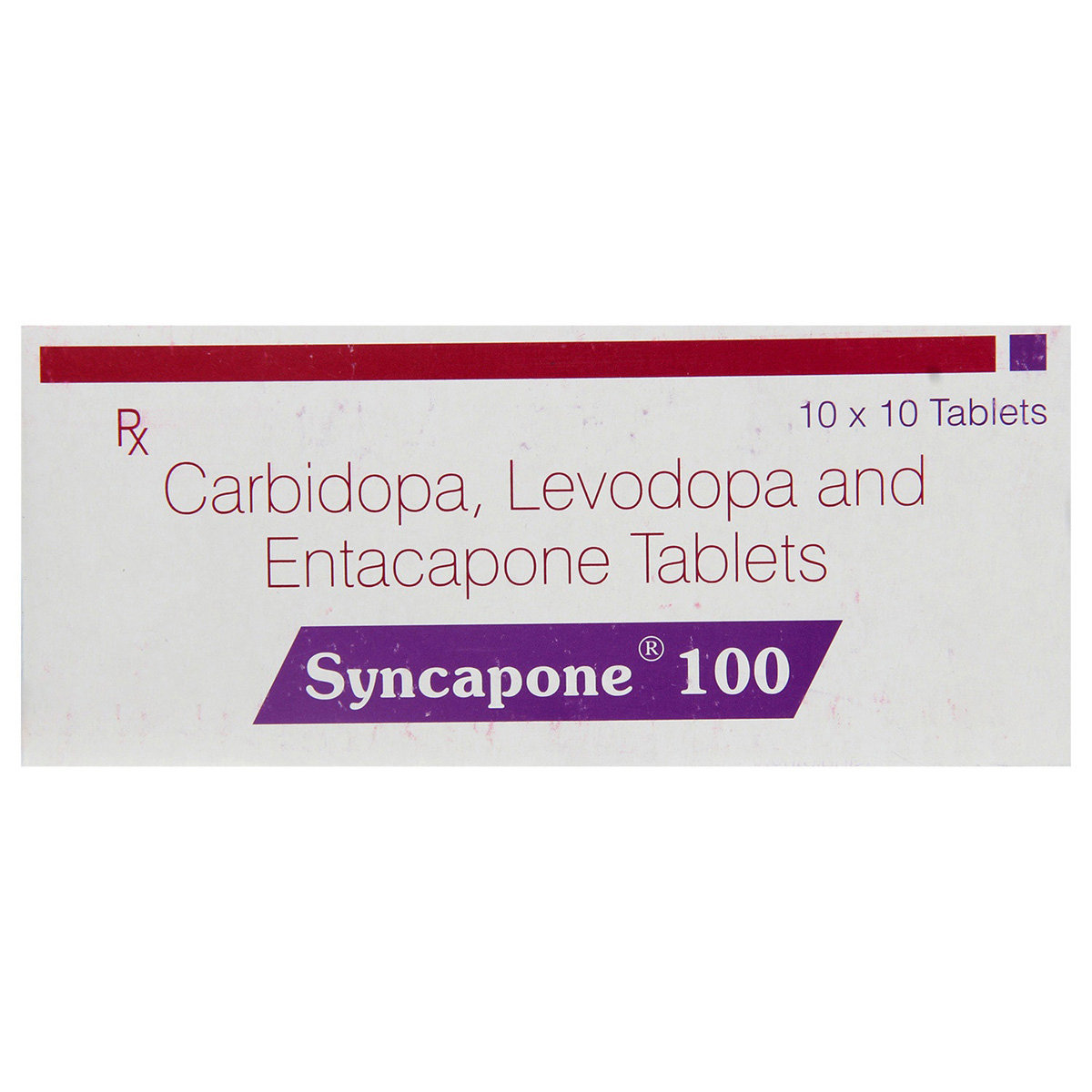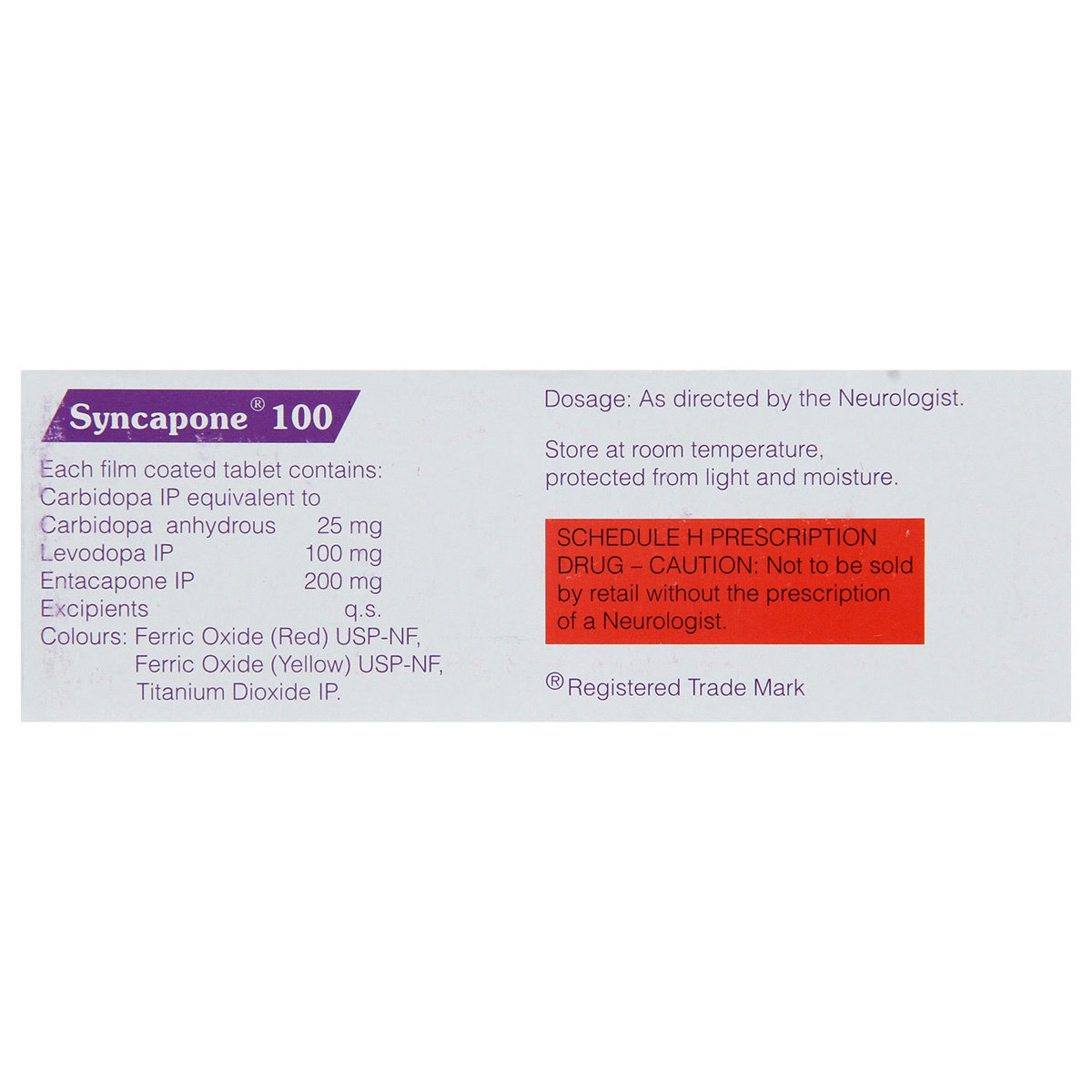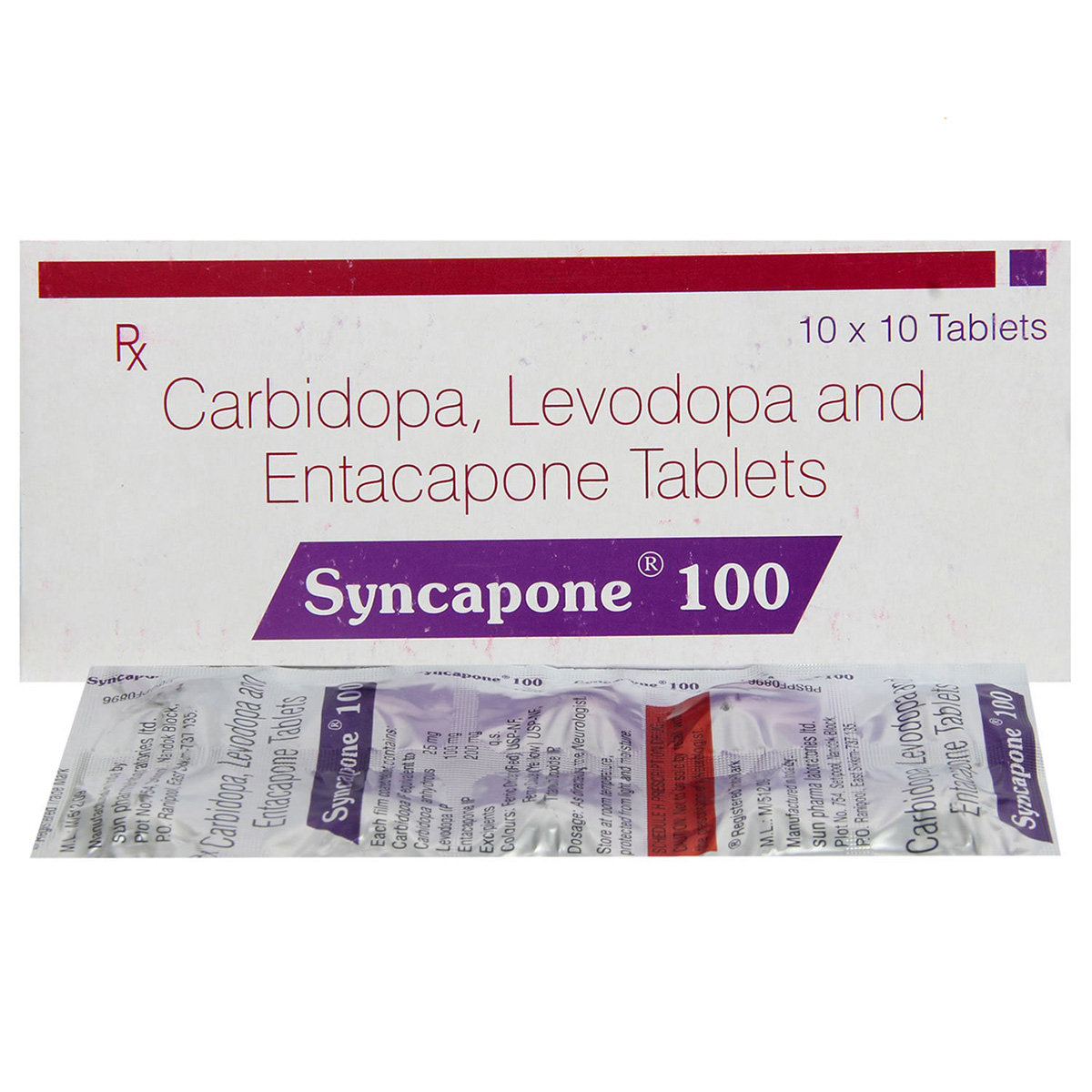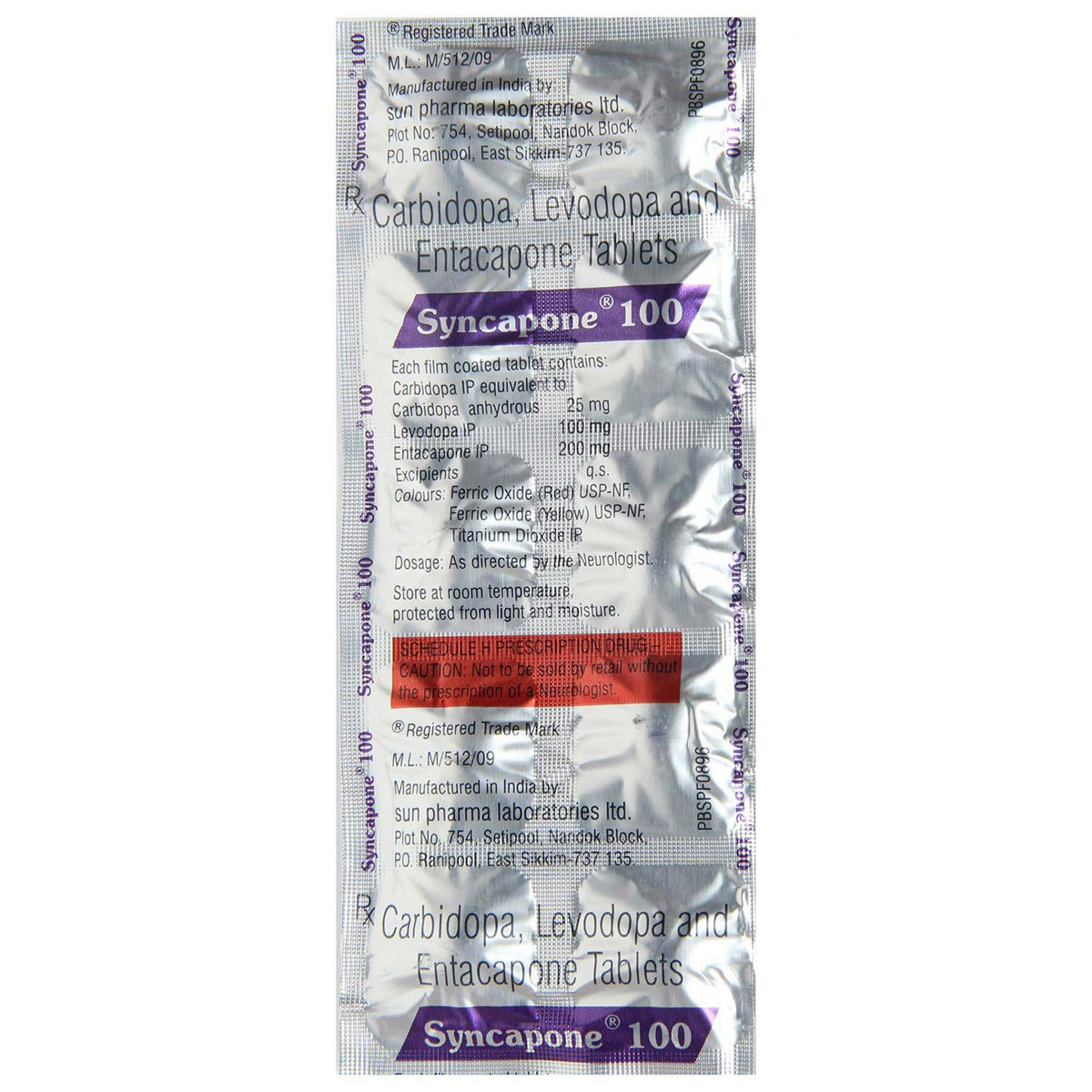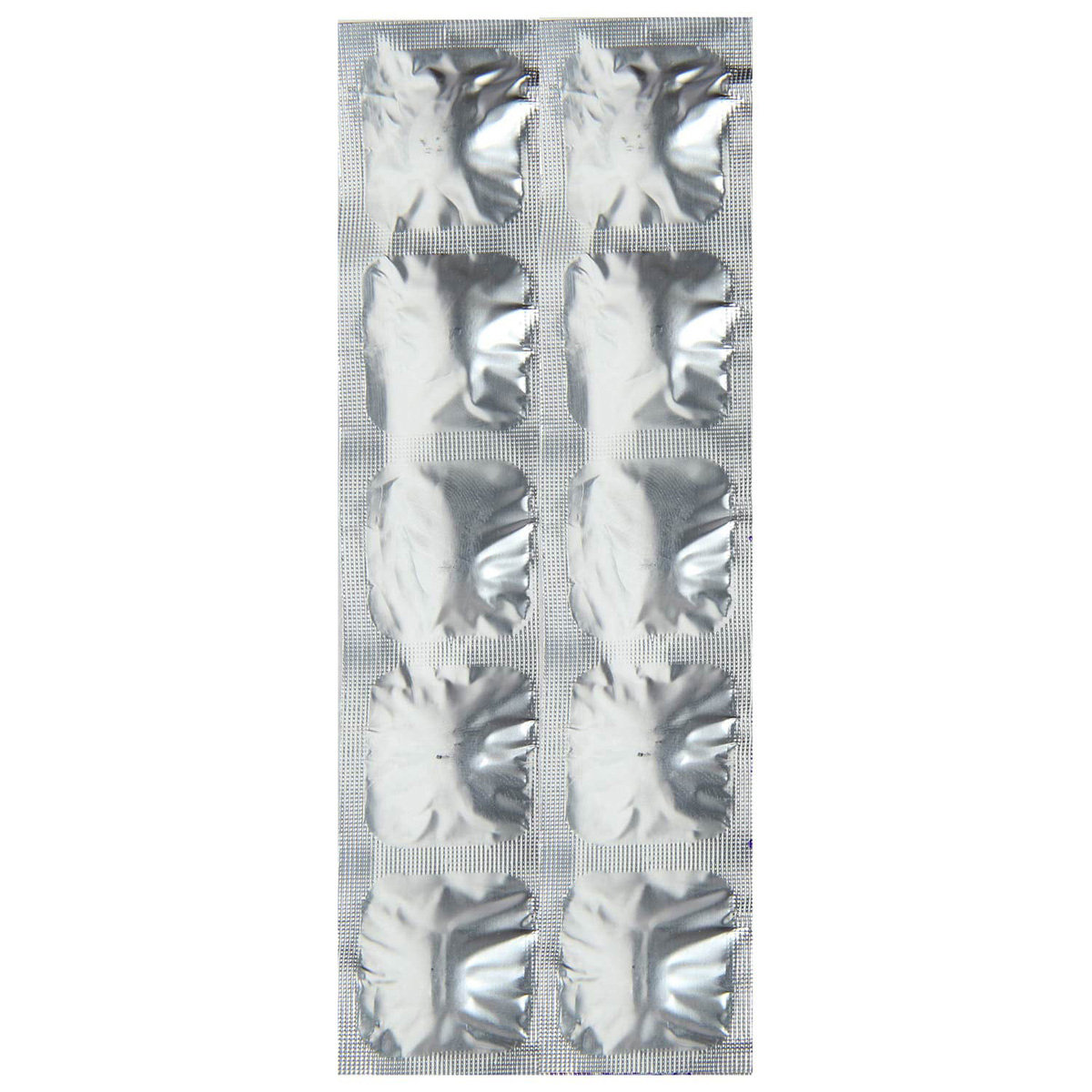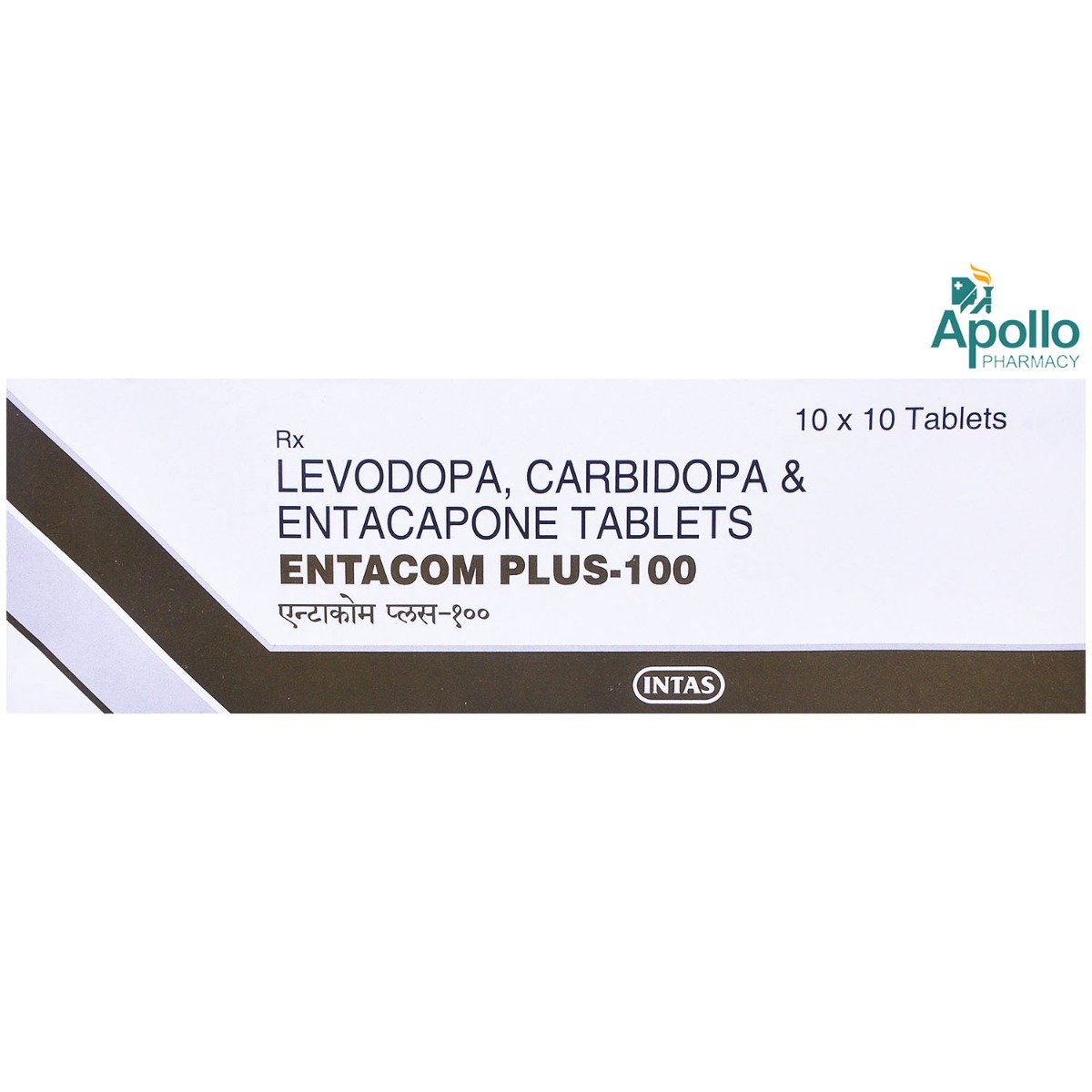Syncapone 100 Tablet 10's
MRP ₹131
(Inclusive of all Taxes)
₹19.6 Cashback (15%)
Provide Delivery Location
Online payment accepted
 Prescription drug
Prescription drugWhats That
Composition :
Manufacturer/Marketer :
Consume Type :
Expires on or after :
Return Policy :
About Syncapone 100 Tablet
Syncapone 100 Tablet belongs to a class of drugs called 'antiparkinson agents', a precursor of dopamine (chemical messenger in the brain) primarily used in treating Parkinson's disease with its symptoms including tremors, spasms, muscle stiffness and poor muscle control. Parkinson's disease is a disorder of the central nervous system that affects movement and locomotion, which causes stiffness, shaking, and difficulty in walking, coordination and balance. In Parkinson's patients, there are low dopamine levels as the nerve cells of the brain (neurons) that produce dopamine begin to die.
Syncapone 100 Tablet contains Carbidopa, Levodopa, and Entacapone. Levodopa belongs to the central nervous system agents, while Carbidopa is a decarboxylase inhibitor. The medicinal component Levodopa changes into dopamine in the brain and helps to control movement. Carbidopa prevents the breakdown of Levodopa in the bloodstream so that more Levodopa can reach the brain. On the other hand, Entacapone belongs to a class of COMT (catechol-o-methyltransferase enzyme) inhibitors which causes higher and more sustained levels of Levodopa in the blood that more Levodopa can reach the brain, leading to greater relief from the symptoms of Parkinson's disease.
Take Syncapone 100 Tablet as prescribed by your doctor. You are suggested to take $ame as long as your doctor has prescribed it after checking your medical condition. The most common side effects of Syncapone 100 Tablet are nausea, vomiting, loss of appetite, light-headedness, lowered blood pressure, confusion, and dyskinesia (uncontrolled/involuntary muscle movement). Most of these side effects of Syncapone 100 Tablet do not require medical attention and gradually resolve over time. However, if the side effects persist or worsen, please consult your doctor.
If you are known to be allergic to Syncapone 100 Tablet or any other medicines, please tell your doctor. Do not take Syncapone 100 Tablet if you are pregnant or breastfeeding unless prescribed by the doctor. Syncapone 100 Tablet should not be given to children as safety and effectiveness have not been established. Syncapone 100 Tablet may cause hallucinations (seeing or hearing things that are not there) in some cases if taken for a prolonged time. So, if you experience hallucinations while taking Syncapone 100 Tablet , please talk to your doctor immediately. Keep your doctor informed about your medicines and health condition and rule out any side effects.
Uses of Syncapone 100 Tablet
Directions for Use
Key Benefits
Syncapone 100 Tablet is an antiparkinson agent that is used in the treatment of Parkinson’s disease. Syncapone 100 Tablet is a combination of three medicines: Carbidopa, Levodopa, and Entacapone. Levodopa belongs to the class of medications name as central nervous system agents, While Carbidopa falls in decarboxylase inhibitors. The medicinal component Levodopa changes into dopamine in the brain and helps to control movement. At the same time, Carbidopa acts by preventing the breakdown of Levodopa in the bloodstream so that more Levodopa can effectively reach the brain to block acetylcholine (a chemical messenger in the brain). Entacapone blocks a certain natural substance, catechol-o-methyltransferase (COMT) (an enzyme that breaks down the levodopa in the body), which causes higher and more sustained levels of levodopa in the blood, so that more Levodopa can reach the brain, leading to greater relief from the symptoms of Parkinson’s disease. This effect allows the levodopa to last longer in the body so that it doesn't wear off before the next dose.
Storage
- Uncontrolled and involuntary movements need immediate medical attention.
- Observe your movements and try to understand and control the particular movement.
- Regularly do strengthening exercises to improve blood flow throughout the body and avoid involuntary movements.
- Implement massage techniques to enhance blood flow to organs.
- Take a balanced diet and quit smoking.
- Practice yoga and meditation to improve thought processes and reduce uncontrolled and involuntary movements.
- Inform your doctor about the nausea and discuss possible alternatives to the medication or adjustments to the dosage.
- Divide your daily food intake into smaller, more frequent meals to reduce nausea.
- Opt for bland, easily digestible foods like crackers, toast, plain rice, bananas, and applesauce.
- Avoid certain foods that can trigger nausea, such as fatty, greasy, spicy, and smelly foods.
- Drink plenty of fluids, such as water, clear broth, or electrolyte-rich beverages like coconut water or sports drinks.
- Use ginger (tea, ale, or candies) to help relieve nausea.
- Get adequate rest and also avoid strenuous activities that can worsen nausea.
- Talk to your doctor about taking anti-nausea medication if your nausea is severe.
- Record when your nausea occurs, what triggers it, and what provides relief to help you identify patterns and manage your symptoms more effectively.
- Talk to your doctor about identifying the cause of the discoloration, adjusting your dose, or switching to a different medication.
- Keep an eye on your urine colour and let your doctor know if you notice any unusual changes.
- Increase your intake of water or other liquids to dilute your urine and restore its normal colour.
- Avoid foods that can change your urine colour, such as beets, rhubarb, and berries.
- Inform your doctor about your anxiety symptoms so that you doctor may explore potential drug interactions and alter your treatment plan.
- Work with your doctor to adjust your medication regimen or dosage to minimize anxiety symptoms.
- Reduce anxiety symptoms by practicing relaxation techniques like meditation, deep breathing, or yoga.
- Regular self-care activities, such as exercise, healthy food, and adequate sleep, can assist control anxiety.
- Surround yourself with a supportive network of friends, family, or a support group to help manage anxiety and stay motivated.
- Regularly track anxiety symptoms and report any changes to your doctor to ensure your treatment plan is effective and adjusted as needed.
- Manage stress by practising deep breathing, yoga or meditation.
- Participating in activities you enjoy, or exercising may also help manage agitation.
- Get enough sleep. Maintain a regular sleep cycle.
- Exercise regularly. Try physical activities like walking, running, or dancing.
- Remember, managing depression as a side effect of medication requires patience, persistence, and collaboration with your healthcare team.
- Tell your doctor about your depression symptoms to adjust medication.
- Consult a therapist or counsel for emotional support.
- Engage in regular exercise to release endorphins (neurotransmitters).
- Practice stress-reducing techniques like meditation and deep breathing.
- Build a support network of friends, family, and support groups.
- Establish a consistent sleep schedule.
- Eat a nutritious diet rich in fruits, vegetables, and whole grains.
- Limit or avoid alcohol and recreational substances.
- Keep a mood journal to track symptoms and progress.
Drug Warnings
Do not stop taking Syncapone 100 Tablet suddenly without talking to your doctor. It may result in a serious neuroleptic malignant syndrome (NMS) that causes fever, muscle cramps or stiffness, unusual body movements, fast heartbeat, sweating, change in thinking, and confusion. Do not take Syncapone 100 Tablet if you are allergic to Syncapone 100 Tablet or any of its ingredients. Tell your doctor if you have any medical history of diabetes, heart attacks, mental illness, stomach ulcers, heart disease, or have recently undergone a surgical procedure. Syncapone 100 Tablet may cause dizziness, lightheadedness, and fainting when you get up too quickly from a lying position, especially when you start taking Syncapone 100 Tablet so please get up gradually. Besides this, a prolonged intake of Syncapone 100 Tablet may lead to greater neuropathy chances (nerve damage). Syncapone 100 Tablet should be given with caution in patients with eye problems (narrow-angle glaucoma), irregular heartbeat (arrhythmia), gastrointestinal bleeding, and psychosis. The use of Syncapone 100 Tablet is restricted if a person takes monoamine oxidase inhibitors (MAOs) or antidepressant drugs like isocarboxazid, phenelzine, selegiline, and tranylcypromine because it can lead to high blood pressure (hypertension) crisis.
Drug-Drug Interactions
Drug-Drug Interactions
Login/Sign Up
Combining Syncapone 100 Tablet with Phenelzine can increase the risk of serious condition called the serotonin syndrome.
How to manage the interaction:
Taking Syncapone 100 Tablet with Phenelzine is not recommended as it can possibly result in an interaction, but it can be taken if your doctor has advised it. However, if you experience extreme changes in blood pressure, increased heart rate, fever, excessive sweating, shivering or shaking, blurred vision, muscle spasm or stiffness, tremor, incoordination, stomach cramp, nausea, vomiting, and diarrhea. contact your doctor immediately. Do not discontinue any medications without consulting a doctor.
Coadministration of Syncapone 100 Tablet with Linezolid might raise serotonin hormone levels in the body, affecting the brain and nerve cells.
How to manage the interaction:
Taking Syncapone 100 Tablet with Linezolid is not recommended as it can result in an interaction, it can be taken if a doctor has advised it. However, if you experience confusion, hallucination, seizure, extreme changes in blood pressure, increased heart rate, fever, excessive sweating, shivering or shaking, blurred vision, muscle spasm or stiffness, tremors, incoordination, stomach cramps, nausea, vomiting, and diarrhea, contact a doctor immediately. Do not discontinue any medications without consulting a doctor.
Coadministration of Syncapone 100 Tablet with Tranylcypromine can increase the risk of high blood pressure and also increase the risk of serotonin syndrome(a condition in which a chemical called serotonin increase in your body).
How to manage the interaction:
Taking Syncapone 100 Tablet with Tranylcypromine can result in an interaction, but can be taken together if prescribed by a doctor. However, consult a doctor if you experience confusion, hallucination(seeing and hearing things that do not exist), fits, blood pressure alteration, increased heart rate, fever, excessive sweating, shivering or shaking, blurred vision, pain in the muscles or stiffness, incoordination, stomach cramps, nausea, vomiting, and diarrhea. Do not discontinue any medications without consulting your doctor.
Combining Syncapone 100 Tablet with Isocarboxazid can increase the risk of serious condition called the serotonin syndrome.
How to manage the interaction:
Taking Syncapone 100 Tablet with Isocarboxazid is not recommended as it can result in an interaction; it can be taken if your doctor has advised it. However, if you experience sudden extreme changes in blood pressure, increased heart rate, fever, excessive sweating, shivering or shaking, blurred vision, muscle spasm or stiffness, tremor, incoordination, stomach cramp, nausea, vomiting, and diarrhea, Contact a doctor immediately. Do not discontinue any medications without consulting a doctor.
Taking Tranylcypromine with Syncapone 100 Tablet can increase the risk of high blood pressure
How to manage the interaction:
Taking Syncapone 100 Tablet with Tranylcypromine is not recommended, but can be taken together if prescribed by a doctor. However, consult a doctor if you experience severe headache, blurred vision, confusion, seizures, chest pain, nausea or vomiting, sudden numbness or weakness (especially on one side of the body), speech difficulties, fever, sweating, lightheadedness and fainting. Do not discontinue any medications without consulting your doctor.
Using Syncapone 100 Tablet together with procarbazine can increase blood pressure and increase the risk of side effects.
How to manage the interaction:
Taking Procarbazine with Syncapone 100 Tablet together can possibly result in an interaction, but can be taken together if prescribed by a doctor. However, consult a doctor if you experience severe headache, blurred vision, confusion, seizures, chest pain, nausea or vomiting, sudden numbness or weakness (especially on one side of the body), speech difficulties, fever, sweating, lightheadedness and fainting. Do not discontinue any medications without consulting your doctor.
Using Syncapone 100 Tablet together with phenelzine can increase blood pressure and increase the risk of side effects.
How to manage the interaction:
Taking Syncapone 100 Tablet with Phenelzine is not recommended, but can be taken together if prescribed by a doctor. However, consult a doctor if you experience severe headache, blurred vision, confusion, seizures, chest pain, nausea or vomiting, sudden numbness or weakness (especially on one side of the body), speech difficulties, fever, sweating, lightheadedness and fainting. Do not discontinue any medications without consulting your doctor.
Combining Syncapone 100 Tablet with Methylene blue can increase the risk of CNS depression (a physiological state that can result in a decreased rate of breathing, decreased heart rate, and loss of consciousness).
How to manage the interaction:
Taking Syncapone 100 Tablet with Methylene blue together can result in an interaction, but it can be taken if your doctor has advised it. It's important to keep an eye on your health. If you notice any of these signs - very high blood pressure, feeling confused or hallucinating, having a seizure, a fast heartbeat, fever, sweating a lot, shivering or shaking, trouble seeing clearly, muscle spasms or stiffness, difficulty coordinating movements, stomach cramps, feeling sick, throwing up, or having diarrhea - make sure to call a doctor right away. Do not discontinue any medications without consulting a doctor.
Taking Syncapone 100 Tablet with Sodium oxybate can increase the risk or severity of side effects like decreased rate of breathing, decreased heart rate, and loss of consciousness.
How to manage the interaction:
Although taking Syncapone 100 Tablet and Sodium oxybate together can cause an interaction, it can be taken if your doctor has suggested it. If you notice any symptoms like fatigue, dizziness, lightheaded, drowsiness, confusion, shortness of breath, chest pain or tightness, make sure to call a doctor right away. Do not stop using any medications without a doctor's advice.
Combining Syncapone 100 Tablet with Procarbazine can increase the risk or severity of side effects like decreased rate of breathing, decreased heart rate, and loss of consciousness.
How to manage the interaction:
Although taking Syncapone 100 Tablet and Procarbazine together can cause an interaction, it can be taken if your doctor has suggested it. If you notice any symptoms like confusion, hallucinations, seizures, fast heartbeat, fever, sweating, shivering, blurred vision, muscle spasms, stiffness, trouble moving, cramps, feeling sick, throwing up, or having diarrhea - make sure to call a doctor right away. Do not stop using any medications without a doctor's advice.
Drug-Food Interactions
Drug-Food Interactions
Login/Sign Up
Diet & Lifestyle Advise
- Drink plenty of water to avoid headaches due to dehydration.
- Limit the consumption of sugar-containing food or food with too many calories but fewer nutrients, as it may cause tooth decay.
- Engaging in physical activity like dancing or exercising will boost the metabolism and make a person more energetic.
- Avoid intake of alcoholic beverages with Syncapone 100 Tablet as it can make a person dehydrated and may affect their sleep. This can make it harder for a person’s body to aid the Syncapone 100 Tablet in fighting off infections.
Side Effects of Syncapone 100 Tablet
- Nausea
- Muscle pain
- Diarrhoea
- Lightheadedness
- Dizziness
- Stomach upset
- Blurred vision
- Anaemia
- Hypotension (low blood pressure)
- Dyskinesias (uncontrolled movement)
- Urine discolouration
Habit Forming
Therapeutic Class
All Substitutes & Brand Comparisons
RX
Out of StockElcepan 100mg/25mg/200mg Tablet
Cipla Ltd
₹61
(₹5.49 per unit)
53% CHEAPERRX
Out of StockElcapon 100 mg/25 mg/200 mg Tablet
Zydus Cadila
₹61.5
(₹5.54 per unit)
53% CHEAPERRX
Entacom Plus 100 Tablet 10's
Intas Pharmaceuticals Ltd
₹128.5
(₹11.57 per unit)
1% CHEAPER
Author Details
We provide you with authentic, trustworthy and relevant information
Drug-Diseases Interactions
Drug-Diseases Interactions
Login/Sign Up
FAQs
Syncapone 100 Tablet is a combination of three medicines namely; Carbidopa, Levodopa, and Entacapone. Levodopa belongs to the class of medications name as central nervous system agents, While Carbidopa fall in the category of decarboxylase inhibitors. The medicinal component Levodopa changes into dopamine in the brain and helps to control movement. While Carbidopa and Entacapone act by preventing the breakdown and causes higher and more sustained levels of Levodopa in the bloodstream so that more Levodopa can reach to brain.
Take Syncapone 100 Tablet medicine precisely as the doctor has directed. Take one dose on a regular basis. Try to take the tablets at the same time of day every day, as this will assist you in making sure to take them.
In some cases, prolonged intake of Syncapone 100 Tablet may lead to autoimmune hemolytic anaemia (red blood cells in the blood are destroyed earlier than normal). Levodopa in Syncapone 100 Tablet can cause the immune system to mistake your own red blood cells for foreign substances. The body responds by making antibodies to attack the body's own red blood cells. The antibodies attach to red blood cells and cause them to break down too early. So, your doctor might recommend regular blood tests while using Syncapone 100 Tablet .
You are recommended to avoid taking protein-rich food (such as chicken, beef, pork, eggs, meats, fish, dairy products, seeds, and nuts), iron supplements, or multivitamin tablets while taking Syncapone 100 Tablet as it may delay and reduce the absorption of levodopa. Thus, reduce the effectiveness of Syncapone 100 Tablet . Please consult your doctor and do as advised for the best results.
Yes, orthostatic hypotension could be a side-effect of Syncapone 100 Tablet . Orthostatic hypotension is a sudden lowering in blood pressure leading to dizziness on standing. If you experience this, do not try to stand up suddenly or start walking, instead lie down and get up slowly only when you feel better. People taking Syncapone 100 Tablet are advised to regularly monitor their blood pressure levels to avoid unpleasant events.
Consult your doctor before taking Syncapone 100 Tablet if you have glaucoma. Syncapone 100 Tablet is contraindicated in patients with narrow-angle glaucoma. Syncapone 100 Tablet may cause blindness on long-term use in the case of patients with narrow-angle glaucoma.
Hallucination is a medical condition in which the person may feel, hear, or believe things that are not true, see things that are not there, or feel unusually suspicious or confused. Syncapone 100 Tablet may cause hallucinations in some cases if taken for a prolonged time. So, if you experience hallucinations while taking Syncapone 100 Tablet , please talk to your doctor immediately.
It is advised not to stop taking Syncapone 100 Tablet without consulting your doctor as it may lead to a severe condition called withdrawal-emergent hyperpyrexia with symptoms such as confusion, fever, muscle stiffness, changes in heartbeat, and breathing. Therefore, take Syncapone 100 Tablet for as long as your doctor has prescribed it and if you experience any of these symptoms while taking Syncapone 100 Tablet , please consult your doctor so that the dose may be gradually reduced.
Drug-Drug Interactions Checker List
- RASAGILINE
- SELEGILINE
- PRAMIPEXOLE
- APOMORPHINE
- MOCLOBEMIDE
- AMITRIPTYLINE
- DESIPRAMINE
- MAPROTILINE
- VENLAFAXINE
- PAROXETINE
- ISOPRENALINE
- ADRENALINE
- METHYLDOPA
- FUROSEMIDE
- ATORVASTATIN
- PYRIDOXINE (VITB6)
- PHENYTOIN
- METOCLOPRAMIDE
- PHENOTHIAZINE
- RISPERIDONE
- ERYTHROMYCIN
- RIFAMPICIN
- AMPICILLIN
- CHLORAMPHENICOL
- ISONIAZID
- NORADRENALINE
- RIMITEROLE
- PAPAVERINE
- BUTYROPHENONES
Special Advise
- Do not exceed more than 1 dose (2 capsules) for any off period (recurring symptoms in between regular doses).
- If you have unusual urges like gambling, spending money, overeating, or increased sexual urges, please inform your doctor before taking the Syncapone 100 Tablet .
Disease/Condition Glossary
Parkinson’s disease: It is a disorder of central nervous system that affects movement due to damage of nerve cells in the brain which reduces the levels of dopamine and leads to symptoms such as stiffness, tremor in one hand, shaking, difficulty in walking, coordination and balance. This condition can last for many years or life-long. Treatment with medicines along with physiotherapy may help to control the symptoms and provide a quality life for as long as possible.

Have a query?
Alcohol
Safe if prescribed
Avoid consumption of alcohol with Syncapone 100 Tablet as it may increase the risk of adverse effects such as drowsiness, dizziness, or difficulty in concentrating.
Pregnancy
Consult your doctor
Syncapone 100 Tablet is a pregnancy Category C medicine. It is unknown whether Syncapone 100 Tablet will affect pregnant women or fetus. Hence, the intake of Syncapone 100 Tablet should be avoided if you are pregnant or planning to become pregnant, as it may harm the baby.
Breast Feeding
Consult your doctor
Syncapone 100 Tablet is excreted in human milk, but the effect of Syncapone 100 Tablet on an infant is unknown. So, Syncapone 100 Tablet is given to a breastfeeding mother only if the doctor thinks the benefits outweigh the risks.
Driving
Safe if prescribed
Syncapone 100 Tablet may cause drowsiness and make you fall asleep suddenly. Therefore, avoid driving if you feel drowsy after taking Syncapone 100 Tablet .
Liver
Consult your doctor
Take Syncapone 100 Tablet with caution, especially if you have a history of Liver diseases/conditions. The dose may be adjusted by your doctor as required.
Kidney
Consult your doctor
Take Syncapone 100 Tablet with caution, especially if you have a history of Kidney diseases/conditions. The dose may be adjusted by your doctor as required.
Children
Safe if prescribed
Syncapone 100 Tablet is not recommended for use in children, as safety and effectiveness have not been established.
Recommended for a 30-day course: 4 Strips

